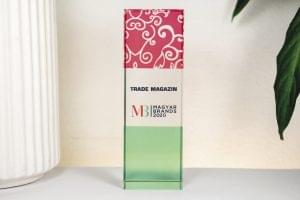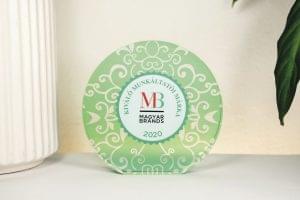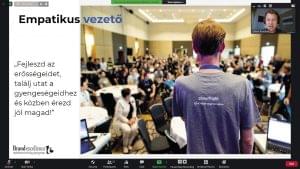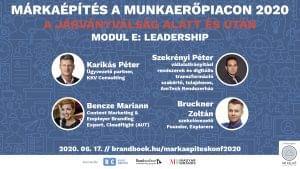Hungarian brands are an asset – this is the message of the MagyarBrands programme
In 2020 the pandemic situation proved that the relationship between brands and their customers can be strengthened further by the conscious responsibility taking of brands. Entries in the MagyarBrands programme also indicated this: besides offering excellent products or services, brands are also present in the lives of consumers, e.g. by providing protective equipment against the coronavirus for free, offering financial help to those who lost their job, etc.


MagyarBrands Programme awarded nearly 850 Hungarian brands in 2020
The MagyarBrands Programme has been rewarding the best Hungarian brands for more than 10 years

Dr. János Serényi,
president of the MagyarBrands Programme
MagyarBrands winners must first undergo a multi-stage survey and then earn the approval of the MagyarBrands jury of experts. The programme only rewards brands that were created in Hungary or Hungarians played a role in establishing it. It also needs to be in Hungarian ownership, be produced in Hungary or score high in the ‘Hungarian identity’ category. The jury of experts evaluates based on three fundamental criteria: identity, reputation and brand building.
Excellent Business Brand: in this category points are given for traditions and reliability too.
Excellent Consumer Brand: traditions, reliability, being well-known and liked are considered in addition to the three fundamental criteria.
Innovative Brand: those brands are honoured which not only do R&D work, but are also creative in forming the company’s structure and in marketing and sales work.
Excellent Employer Brand: in this category those entries are eligible which win in any of the basic MagyarBrands categories mentioned above.
Excellent Employer Brand
Winners have been announced in this category since 2018. Winner workplaces are familiar with the needs of employees and take steps to be successful in this field. Last year this was the field where brands had to react the fastest and the most effectively. We asked jury members: What can help companies in this rapidly changing world to be successful employers?
Ferenc Harangozó – communication expert
‘Entries show that companies have made great progress in understanding and managing employer branding: the ties between the HR and the communication departments are strengthening. Still, there is room for improvement in using an integrated approach and in developing a solution where the values of the company are communicated in a voice that is unique. It is worth pursuing this path, because this way a firm basis can be created that can help in managing crises like the COVID-19 pandemic.’

Brandexcellence Academy within the frames of the MagyarBrands Programme launches online trainings on a monthly basis
Zita Kulcsár – employee experience designer (worki):
‘The evaluation criteria are work-life balance, integrated approach, employee involvement, programme relevance and credibility. These criteria aren’t about what is happening on the surface at an employer, but about the core values that shape the corporate culture. These are the values that are resistant and stand the test of time.’

Award-winning brands may take part in conferences and professional trainings within the framework of the Programme
MagyarBrands 2021
The events of 2020 say it loud and clear that we need the Excellent Consumer Brand, Excellent Business Brand, Innovative Brand and Excellent Employer Brand awards very much. MagyarBrands is waiting for applications in 2021 too. More information is available at www.magyarbrands.hu (x)
Brand-building in times of a pandemic
Digitalisation process accelerates

Tamás Barna
managing director
Republic Group
The pandemic crisis put online solutions in the limelight. Brands and shoppers had to adapt to the new situation very quickly, and those could come out of this turmoil as winners who quickly switched to selling online without difficulties. In the light of the current health and financial problems brands must communicate emphatically. Last year the digital transformation – and on the consumer side digital literacy – developed so fast that the same progress could have only been made in many years without the pandemic. Many brands decided to go in the direction of B2C sales, opening online shops, creating pick-up points or starting home delivery, e.g. one of the MagyarBrands winners is a winery that now sells its products online too. //
Adapting to the unexpected

Zsuzsanna Hermann
managing director-editor in chief
Trade magazin
We have learned during the pandemic that brand building can be done in a crisis situation too. Certain consumption habits have changed and this entailed changes in communication. Those brands were able to manage transforming consumption habits the best that reacted to them quickly. This need for speed became the driving force of digitalisation. Services had to be redesigned, as formerly only digitally competent consumers were using them, but with the breakout of the pandemic companies also had to think of unskilled and inexperienced internet users. Another key thing is a new attitude towards consumers: since they are making increasingly rationalistic decisions, they want clear and tangible values from brands – and to be treated as equal partners. //
Winners and losers

Bálint Hinora
managing director
Hinora Group
Because of the pandemic external conditions for businesses are unstable, for instance in certain sectors (tourism, hospitality, etc.) they still don’t know what is going to happen. At the same time the role of marketing has become more important, as there is no sales growth and innovation without this – those companies that understood this can come out of the crisis much stronger than before. Brand presence had to be strengthened the most on online platforms. It might be a commonplace that a crisis has winners and losers. Some of the winners in this competition come from the winner sectors, but these brands aren’t only successful thanks to the external conditions. It is very important for a company to diversify: crisis-proof brands don’t just depend on one product or service. //
Marketing now gives way to PR

Zsófia Lakatos
managing director
Emerald Public Relations
The pandemic and the crisis it induced is transforming the lives of brands completely. In this new situation brands have to show more empathy and partnership. Companies need to realise that consumers were forced to leave their comfort zones, and they want brands to help them by understanding what they need and by giving them values. Value marketing doesn’t mean that a company doesn’t want to sell its product; it means that a purpose is tied to it and through this the consumer becomes a partner, and the two are supporting a good cause together. Only those brands will survive this period that can change their attitude this way: PR taking over the place of marketing. //
A new stage of digital maturity

Gabriella Liptay
marketing- and communications
director
KPMG
Mission-driven companies and brands focus in sustainability and social usefulness, and react to the challenges ahead of the community in credible and active fashion. They do this in a fully digital environment, with a stronger presence than before. I think that the field of communication is very busy and those brands can stay afloat which can represent relevant goals that are tied to their brands the most credibly. Companies and brands have reached a new stage of digital maturity recently. Practically this is the only way to survive these days: today online events, streaming solutions, podcasts and videocasts form an essential part of the communication mix. They aren’t just channels for various types of content, but also vehicles for the brands. //
Opportunities ahead of Hungarian brands

Bálint Nagy
head of marketing department
IBS International Business School
What is a Hungarian brand and why is it important to be one? This is a complex question in today’s globalised world. In the market being different, identifiable and loveable are very important. The Covid-crisis has created a great opportunity for Hungarian brands: in the online space they can reach more people at lower cost with their messages than by using classic marketing tools. Plus there are no borders if you use YouTube, Facebook or Instagram! With the Magyar Brands certification the goal is to find products and services that make international consumers think of Hungary when they hear their name. //
Aibo, come closer to us!

Dr. János Serényi
owner, managing
director
Értéktrend Consulting
As an impact of the COVID-19 pandemic, consumer expectations changed: being together, friendship, healthy and safety have become more important. The next step was the strengthening of conversational marketing – shoppers wanted more information, support and compassions. Then a new type of need developed: HUMANS didn’t want to just to get help any more, they also wanted to give help, so many brands built their messages around this trend, in the spirit of ‘Let’s help together!’ The latest stage in this process of emotional changes has manifested in Japan. Aibo is a robot dog that has been making the lives of owners happier for 23 years now. Every Aibo is different and recently Japanese consumers have started preferring models that aren’t perfect, but need help from time to time. //
It is essential to adapt to shopper priorities

Dr. Gedeon Totth
college lecturer, president
MMSZ Agrarian and
Food Marketing
Division
A crisis temporarily changes product category preferences. Brands have tried to adapt to the new-type consumption and buying habits, and many have done it well as they hardly lost any customers. During the first wave of the pandemic store choice preferences also transformed (efficiency became important instead of the shopping experience), and this also had to be taken into consideration by brand owners. I think that those brands which have a characteristic image and a loyal buyer base suffer smaller losses when a crisis hits. My view is that those core values with which a brand can contribute to the common good have become more important, and this will bring brand communication closer to CSR in the near future. //
Related news
II. Green Gastronomy – Marketing Communication Workshop organized by the MMSZ HoReCa and Green Section
🎧 Hallgasd a cikket: Lejátszás Szünet Folytatás Leállítás Nyelv: Auto…
Read more >State support scheme
🎧 Hallgasd a cikket: Lejátszás Szünet Folytatás Leállítás Nyelv: Auto…
Read more >Related news
MOHU: 5,200 return points are in operation, but 47 larger settlements still do not have RE points – public “enema” machines may be introduced
🎧 Hallgasd a cikket: Lejátszás Szünet Folytatás Leállítás Nyelv: Auto…
Read more >GDP growth in OECD member countries slowed to 0.3 percent in the last quarter of last year
🎧 Hallgasd a cikket: Lejátszás Szünet Folytatás Leállítás Nyelv: Auto…
Read more >Change in Rossmann Hungary’s leadership: Kornél Németh decided to move towards new challenges in 2026
🎧 Hallgasd a cikket: Lejátszás Szünet Folytatás Leállítás Nyelv: Auto…
Read more >









